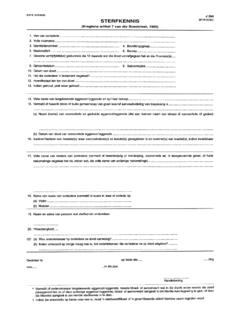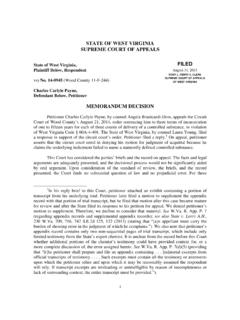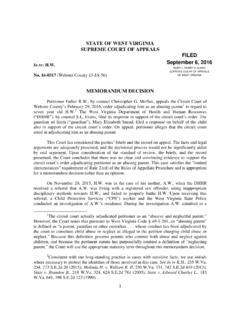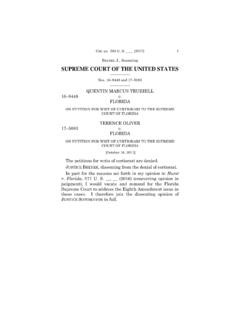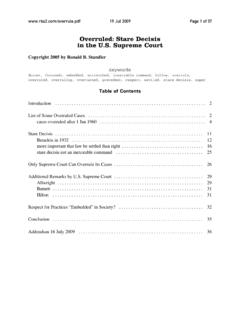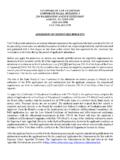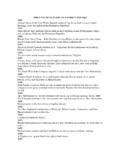Transcription of IN THE SUPREME COURT OF APPEAL OF SOUTH …
1 IN THE SUPREME COURT OF APPEAL . OF SOUTH AFRICA. REPORTABLE. CASE NO: 493/2000. In the matter between: THE PERMANENT SECRETARY, DEPARTMENT OF WELFARE, EASTERN CAPE PROVINCIAL GOVERNMENT First Appellant MEMBER OF THE EXECUTIVE COUNCIL FOR WELFARE, EASTERN. CAPE. PROVINCIAL GOVERNMENT Second appellant and MN NGXUZA First Respondent NM MELTAFA Second Respondent S MBOYIYA Third Respondent BEFORE: Hefer ACJ, Harms, Streicher, Cameron and Mpati JJA. HEARD: 15 August 2001. DELIVERED: 31 August 2001. Class action under Constitution quintessential requisites for action and requirements for definition of class set out Jurisdiction . inclusion of class members outside jurisdiction of forum COURT cannot impede progress of action Provincial government's conduct of litigation criticised JUDGMENT. CAMERON JA: 1[] The law is a scarce resource in SOUTH Africa.
2 This case shows that justice is even harder to come by. It concerns the ways in which the poorest in our country are to be permitted access to both. In the Eastern Cape Division of the High COURT four individual applicants, assisted by the Legal Resources Centre, brought motion proceedings against the Eastern Cape provincial government (represented by respectively the departmental and political heads of provincial welfare, who are the first and second appellants). They sought two-fold relief. The first portion was to reinstate the disability grants they had been receiving under the Social Assistance Act,1 which the province had without notice to them terminated. The province conceded the claims of three of the applicants, with payment of arrears and interest. They are the respondents in the APPEAL (I refer to them as the applicants ).
3 A fourth applicant failed, and he plays no further part in the proceedings in which the contested issue is the immensely more expansive, second portion of the relief the applicants sought. That concerned the plight of many tens of thousands of Eastern Cape disability grantees they alleged were in a similar predicament to themselves, in that they, too, had had their grants unfairly and unlawfully terminated. On their behalf, aiming to secure the reinstatement en masse of their cancelled pensions, the applicants sought to institute representative, class action and public interest 1. Act 59 of 1992, sections 2(a), 3(a). The Act's reference to social grants to .. disabled persons has been popularised to disability grant . The Act requires the Minister for Welfare and Population Development amongst other things (with the concurrence of the Minister of Finance) to make disability grants out of moneys appropriated by the Provincial Legislature (section 2(a)).
4 Section 3(a) creates an entitlement to such a grant if the Director-General of Welfare is satisfied as to conditions specified in the Act and the regulations. The functions of the Director-General were in terms of Proclamation R7, Regulation Gazette 5643 of 23 February 1996 assigned to the Permanent Secretary: hence the first appellant. 3. proceedings in terms of s 38(b), (c) and (d) of the (e) an association acting in the interest of its members. Froneman J, in a judgment now reported,3 granted them leave to 2. 3[] The applicants decided to proceed with a class action under s 38(c), with the result that the order as to the other bases of standing is not at issue before us. The order has three essential features. First, it permitted the applicants, assisted by the Legal Resources Centre, to litigate as representatives on behalf of anyone in the whole of the Eastern Cape Province whose disability grants were between specified dates cancelled or suspended by or on behalf of the Eastern Cape government ( the class definition ).
5 Associated with this was an order requiring the Eastern Cape government to provide the Legal Resources Centre with the details of the members of the class kept on computer or physical file in governmental records ( the disclosure order ). The order lastly required the applicants to disseminate through various print and radio media in the Eastern Cape and (with the assistance of the provincial government) by notices at pension pay points information about the class action ( the publication order ). The object of publication was to give members of the class the opportunity if they wished to opt out of the proceedings envisaged on their behalf. 2. Section 38 provides: Enforcement of rights Anyone listed in this section has the right to approach a competent COURT , alleging that a right in the Bill of Rights has been infringed or threatened, and the COURT may grant appropriate relief, including a declaration of rights.
6 The persons who may approach a COURT are . (a) anyone acting in their own interest;. (b) anyone acting on behalf of another person who cannot act in their own name;. (c) anyone acting as a member of, or in the interest of, a group or class of persons;. (d) anyone acting in the public interest; and 3. Ngxuza and others v Permanent Secretary, Department of Welfare, Eastern Cape, and others 2001 (2) SA 609. (E). 4. The terms of the order, as amended on the return day, are reported at 2001 (2) SA 633-4. 4. 4. 5[] In the APPEAL , brought with the leave of Froneman J (who ordered in terms of rule 49(11) of the Uniform Rules of COURT that the disclosure and publication orders be implemented pending the APPEAL ), the Eastern Cape government attacked both the grant of leave to institute the class action and the disclosure order. The original grounds of attack were expressed in far-ranging terms.
7 Senior counsel who appeared for the province at the hearing of the APPEAL , who did not draw the written argument, told us that he was not instructed to abandon all the original grounds of attack, but he refrained from advancing submissions in support of them. Given the ill-considered nature of many of them, to which I return later, this was a prudent approach. What he relied on was two contentions: (i) that the order did not adequately define the class;. and (ii) that it wrongly and without jurisdictional warrant included in the class residents of the Eastern Cape province outside the domain of the Eastern Cape Division of the High COURT . Counsel rightly conceded that the disclosure order in effect a form of discovery adjunct to, and necessary for, the applicants' claim to relief was an inevitable concomitant of the class definition order.
8 The critical question before us is therefore the terms of that order. 6. 7[] In the type of class action at issue in this case, one or more claimants litigate against a defendant not only on their own behalf but on behalf of all other similar The most important feature of the class action is that other members of the class, although not formally and individually joined, benefit from, and are bound by, the outcome of the litigation unless they invoke prescribed procedures to opt out of it. 5. Defendants may also be sued as members of a class. 5. The class action was until 1994 unknown to our law, 6 where the individual litigant's personal and direct interest in litigation defined the boundaries of the COURT 's powers in it. If a claimant wished to participate in existing COURT proceedings, he or she had to become formally associated with them by compliance with the formalities of The difficulties the traditional approach to participation in legal process creates are well described in an analysis that appeared after the class action was nationally regularised in the United States through a federal rule of court8 more than sixty years ago: The cardinal difficulty with joinder.
9 Is that it presupposes the prospective plaintiffs'. advancing en masse on the courts. In most situations such spontaneity cannot arise either because the various parties who have the common interest are isolated, scattered and utter strangers to each other. Thus while the necessity for group action through joinder clearly exists, the conditions for it do not. It may not be enough for society simply to set up courts and wait for litigants to bring their complaints they may never come. What is needed, then, is something over and above the possibility of joinder. There must be some affirmative technique for bringing everyone into the case and for making recovery available to all. It is not so much a matter of permitting joinder as of ensuring it. 9. 1[] The class action cuts through these complexities. The issue between the members of the class and the defendant is tried once.
10 The judgment binds all, and the benefits of its ruling accrue to all. The procedure has particular utility where a large group of plaintiffs each has 6. SOUTH African Law Commission Report on the Recognition of Class Actions and Public Interest Actions in SOUTH African Law (Project 88, August 1998) para ; H Erasmus Superior COURT Practice A2-4H; G Budlender The Accessibility of Administrative Justice 1994 Acta Juridica 128; E Hurter The draft legislation concerning public interest and class actions: the answer to all class ills? (1997) XXX Cilsa 304. 7. LTC Harms Civil Procedure in the SUPREME COURT par C1. 8. Rule 23 of the Federal Rules of Civil Procedure, Class Actions , introduced in 1938: see Sunderland, The New Federal Rules , (1938) 45 West Virginia Law Quarterly 5. Rule 23 (a), Prerequisites to a Class Action , provides that one or more members of a class may sue or be sued as representative parties on behalf of all only if (1) the class is so numerous that joinder of all members is impracticable, (2) there are questions of law or fact common to the class, (3) the claims or defenses of the representative parties are typical of the claims or defenses of the class, and (4) the representative parties will fairly and adequately protect the interests of the class.









